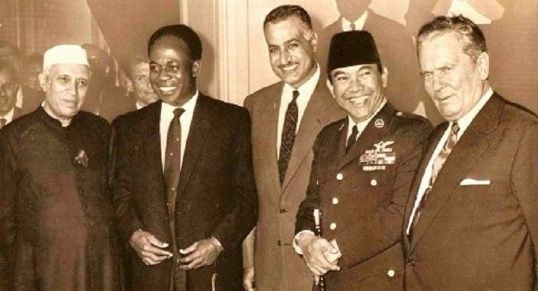Non-alignment kept us hostile to the West in the past; Beijing wants that India should persist with the same policy, now rephrased as strategic autonomy; we don’t disappoint it.
For all its talk about Panchsheel or Five Principles of Peaceful Coexistence and its supposed commitment to cordial ties with India, China persists with its anti-India stance and actions. Beijing’s objection to Vice-President Venkaiah Naidu’s October 9 visit to Arunachal Pradesh underlines its duplicity and bellicosity.
At a media briefing, Chinese Foreign Ministry spokesman Zhao Lijian said, “China’s position on the boundary issue is consistent and clear. The Chinese government has never recognized the so-called Arunachal Pradesh, established unilaterally and illegally by the Indian side and is firmly opposed to the Indian leader’s visit to the area concerned.”
After firing the salvo, he went on to lecture New Delhi on trust: “We urge the Indian side to earnestly respect China’s major concerns, stop taking any action that would complicate and expand the boundary issue and refrain from undermining mutual trust and bilateral relations.”
In a way, China’s India policy is “consistent and clear”: India should “earnestly respect China’s major concerns,” but China won’t.
Unfortunately for us, too many of our political masters have been too anxious to respect China’s major concerns. Jawaharlal Nehru did his utmost to appease Mao Zedong and Zhou-en Lai, even though it hurt his popularity among the people and within his own party. He recognized Tibet as part of China, but China neither settled the boundary between the two countries nor recognized India’s claim over its entire territory.
Decades later, another Prime Minister, Atal Bihari Vajpayee, too called Tibet as an integral part of China, again without any reciprocal gesture.
Appeasement is not an appetite suppressant but a great appetizer: the more the beast gets it, the hungrier it becomes. It happened in the past: Hitler’s strength and hunger grew with appeasement, resulting in the Second World War. The same is true for India-China relations.
No amount of confidence building measures on our part can make the Chinese Communist Party happy. Prime Minister Narendra Modi met Chinese President Xi Jinping 18 times. To no avail.
The only thing that rattled Beijing was the Quad. With India joining a quasi-alliance primarily targeted at China, the dragon felt threatened.
Just as Beijing began feeling the heat of the four major democracies arming themselves to take it on, India’s deep pink state and deeper anti-Americanism struck back—much to China’s relief. The Lutyens Zone, still a bastion of the Nehruvian Consensus, revived the thoroughly discredited policy of non-alignment and made announcements that Quad is not a military alliance.
China must be very happy, for India is now doing exactly what Beijing always wanted it to do: persist with the disastrous policy of “strategic autonomy”, which is nothing but non-alignment in different words.
Speaking at a dialogue co-hosted by the School of International Studies of Sichuan University, China Center for South Asian Studies, and the Manohar Parrikar Institute for Defence Studies & Analyses, Beijing’s envoy to New Delhi Sun Weidong said on 24 September, “China and India should uphold strategic autonomy and grasp fate in our own hands… At present, some countries, with their ideological bias and Cold War mentality, vigorously seek closed and exclusive ‘small cliques’ with the aim of containing the third party, stoking bloc confrontation and geopolitical games.”
About a week later, on the occasion of the 72nd anniversary of the founding of communist China, he reiterated that the two countries should “adhere to the Five Principles of Peaceful Coexistence, respect the core interests and major concerns of each other, uphold strategic autonomy, and refrain from interfering in each other’s internal affairs or engaging in any ‘alliance’ or ‘quasi alliance’ targeting the other”.
In short, the Chinese believe that Indians are the people who can be fooled all the time. Panchsheel damaged us in the 1950s and the 1960s—and we usually prove them right.
Non-alignment kept us hostile to the West in the past; Beijing wants that India should persist with the same policy, now rephrased as strategic autonomy; we don’t disappoint it. In the past, we mostly fought Chinese aggression with words; they want us to continue our word war, the “strongly condemn…” type of statements. Unfortunately, that is exactly what we are doing now also.
Reacting to China’s objection to the Vice-President’s Arunachal visit, MEA spokesperson Arindam Bagchi said, “We have noted the comments made today by the Chinese official spokesperson. We reject such comments. Arunachal Pradesh is an integral and inalienable part of India.”
For how long will we have to endure such dialogue-baazi? And that too in the face of an enemy as dangerous as China which is run by CCP thugs.
The truth is that the CCP is the vilest communist party of the world. Its commissars have blended two violent ideologies, communism and nationalism, resulting in unprecedented lethality.
Instead of seeing the reality as it is, too many mandarins and other policymakers seek escape in the dreamscape called strategic autonomy.
Ravi Shanker Kapoor is a freelance journalist.

